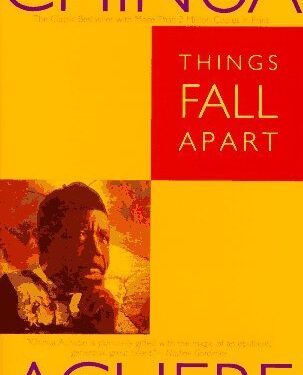Discuss the theme of cultural identity in Chinua Achebe’s Things Fall Apart
Chinua Achebe’s “Things Fall Apart” is a novel that explores the theme of cultural identity through the protagonist, Okonkwo, and his struggles to maintain his cultural identity amidst the colonial influence of the British in Nigeria. The novel is set in the late 19th century and centers around the life of Okonkwo, a successful farmer and warrior, who is highly respected in his village of Umuofia. Through Okonkwo’s story, Achebe explores the theme of cultural identity, examining the conflicts and challenges faced by individuals and societies in the face of cultural change.
Discuss the theme of cultural identity in Things Fall Apart:-The novel opens with a description of Okonkwo’s village, Umuofia, and its customs and traditions. It is a tightly knit community with a strong sense of tradition and culture, and Okonkwo is one of its most respected members. He is a fierce warrior who has earned his status through hard work and determination. He is also a proud and stubborn man who strongly adheres to the customs and traditions of his people. His father, Unoka, was a lazy and unsuccessful man who was ridiculed by the village. Okonkwo is determined not to follow in his father’s footsteps and strives to become a successful and respected member of the community.
Also Read:-
- How does William Shakespeare use the concept of honor
- Discuss the theme of mortality in Emily Dickinson’s poetry
- Analyze the use of metaphor in Walt Whitman’s Song of Myself
- How does Gabriel Garcia Marquez use the concept of time in Love in the Time of Cholera
Okonkwo’s identity is closely tied to his culture and traditions, and he is fiercely protective of them. He is deeply disturbed by the arrival of the British missionaries and the changes they bring to his community. He sees them as a threat to his way of life and the traditions he holds dear. He believes that the British are trying to destroy the culture and traditions of his people and replace them with their own. He is also deeply disturbed by the willingness of some of his fellow villagers to accept the British and their ways.
Discuss the theme of cultural identity in Things Fall Apart:-One of the most significant conflicts in the novel is the clash between Okonkwo’s traditional cultural identity and the colonial influence of the British. The British missionaries bring with them a new religion, Christianity, which is diametrically opposed to the beliefs and practices of the Igbo people. They also introduce new ways of life, such as the introduction of a formal education system, which threatens to erode the traditional practices and values of the Igbo people. Okonkwo sees these changes as a direct threat to his cultural identity, and he becomes increasingly frustrated and angry as he witnesses his community slowly succumbing to the influence of the British.
Discuss the theme of cultural identity in Things Fall Apart:-The novel explores the theme of cultural identity through Okonkwo’s struggle to maintain his cultural identity in the face of the colonial influence of the British. He is torn between his desire to uphold the traditions and values of his people and his fear of being left behind by the changing times. His stubbornness and pride prevent him from accepting the changes that are happening around him, and he is unable to adapt to the new reality. His rigidity ultimately leads to his downfall, as he is unable to reconcile his traditional cultural identity with the changing times.
Discuss the theme of cultural identity in Things Fall Apart:-Achebe also explores the theme of cultural identity through the character of Nwoye, Okonkwo’s son. Nwoye is a sensitive and thoughtful boy who is deeply troubled by the violence and brutality of his father’s ways. He is drawn to the Christian missionaries and the new religion they bring, which offers a more peaceful and compassionate way of life. Nwoye’s decision to convert to Christianity is seen as a betrayal by his father and a rejection of his cultural identity. Okonkwo is unable to accept his son’s decision, and the two become estranged. Nwoye’s journey is a reflection of the struggles faced by individuals who find themselves torn between their cultural identity and the desire for change and progress.
Things Fall Apart “Summary”
“Things Fall Apart” by Chinua Achebe is a novel set in pre-colonial Nigeria that explores the themes of cultural identity, tradition, and colonialism. The novel follows the story of Okonkwo, a respected member of the Igbo community in Umuofia, who strives to uphold the traditions and values of his culture.
Discuss the theme of cultural identity in Things Fall Apart:-The novel begins by introducing Okonkwo as a man who has achieved great success and respect in his village through hard work and determination. He is a skilled farmer, a fierce warrior, and a respected leader in his community. However, despite his success, Okonkwo harbors deep-seated fears and anxieties, stemming from his father’s reputation as a lazy and unsuccessful man. Okonkwo is determined to distance himself from his father’s legacy and to prove his worth through his own accomplishments.
The novel then delves into the customs and traditions of the Igbo community, portraying the rituals and beliefs that shape their way of life. The novel also explores the social structure of the community, highlighting the roles and responsibilities of men, women, and children. It is clear that tradition and cultural identity are highly valued in the community, and any challenge to these values is met with resistance.
Discuss the theme of cultural identity in Things Fall Apart:-As the novel progresses, the arrival of European missionaries begins to disrupt the traditional way of life in Umuofia. The missionaries bring Christianity and a new way of thinking that clashes with the Igbo culture. Okonkwo and the community initially view the missionaries with suspicion and hostility, but their influence begins to spread, and some members of the community convert to Christianity.
The arrival of the missionaries also brings the arrival of the British colonial government, which seeks to establish control over the region. The British officials are portrayed as arrogant and dismissive of African culture and traditions, and their actions lead to conflict and resistance from the Igbo people. The novel portrays the devastating impact of colonialism on traditional African culture, as the Igbo people are forced to adapt to new ways of life and abandon their customs and beliefs.
Discuss the theme of cultural identity in Things Fall Apart:-Throughout the novel, Okonkwo is depicted as a man who is fiercely protective of his cultural identity and traditions. He resists the influence of the missionaries and the British colonial government, believing that they are a threat to the way of life that he holds dear. However, his rigid adherence to tradition ultimately leads to his downfall, as he becomes increasingly isolated from the community and his own family.
One of the central conflicts in the novel is between Okonkwo and his son Nwoye. Nwoye is portrayed as a sensitive and thoughtful young man who is struggling to reconcile his own beliefs with the expectations of his father and the community. He is drawn to the teachings of the missionaries and ultimately converts to Christianity, causing a rift between him and his father. The conflict between Okonkwo and Nwoye highlights the challenges faced by individuals and communities in the face of cultural change.
Discuss the theme of cultural identity in Things Fall Apart:-In the final chapters of the novel, Okonkwo’s resistance to change leads him to commit a tragic act that ultimately results in his exile from Umuofia. The novel ends on a somber note, as the community struggles to adapt to the changes brought about by colonialism and the loss of their traditional way of life.
Overall, “Things Fall Apart” is a powerful and thought-provoking novel that explores the themes of cultural identity and tradition in the face of colonialism. Through the character of Okonkwo and his community, Achebe portrays the complexities and challenges of cultural change and highlights the importance of valuing and preserving cultural identity in the face of external influences. The novel is a timeless masterpiece that continues to resonate with readers around the world.
Conclusion
Chinua Achebe’s “Things Fall Apart” is a powerful novel that explores the theme of cultural identity through the struggles of the protagonist, Okonkwo, and his community. The novel vividly portrays the clash between traditional African culture and the colonial influence of the British in Nigeria. Achebe portrays the complex and multifaceted nature of cultural identity, highlighting the conflicts and challenges that individuals and societies face in the face of cultural change.
Through the character of Okonkwo, Achebe portrays the dangers of being too rigid and stubborn in one’s cultural identity. Okonkwo’s unwillingness to adapt to the changing times ultimately leads to his downfall. Through the character of Nwoye, Achebe explores the struggles faced by individuals who find themselves torn between their cultural identity and the desire for change and progress.
Overall, “Things Fall Apart” is a timeless and poignant novel that continues to resonate with readers around the world. It is a powerful reminder of the importance of cultural identity and the challenges faced by individuals and societies in the face of cultural change. Achebe’s masterful storytelling and vivid portrayal of the complexities of cultural identity make “Things Fall Apart” a must-read for anyone interested in African literature, history, and culture.
FAQ.
Q. What is the significance of the title “Things Fall Apart”?
Ans. The title “Things Fall Apart” is a reference to a line in W.B. Yeats’ poem “The Second Coming,” which speaks to the breakdown of society and the loss of order. In the novel, the title symbolizes the collapse of traditional African culture and the impact of colonialism on the Igbo people.
Q. What is the main theme of the novel?
Ans. The main theme of the novel is cultural identity and the impact of colonialism on traditional African culture. The novel explores the conflicts and challenges faced by individuals and societies in the face of cultural change, as well as the dangers of clinging too tightly to tradition and refusing to adapt to changing times.
Q. Who is the protagonist of the novel?
Ans. The protagonist of the novel is Okonkwo, a successful farmer and warrior who is highly respected in his village of Umuofia. Through Okonkwo’s story, Achebe explores the theme of cultural identity and the challenges faced by individuals in the face of cultural change.
Q. What is the significance of the setting of the novel?
Ans. The novel is set in late 19th-century Nigeria, during the height of British colonialism. The setting is significant because it highlights the impact of colonialism on traditional African culture and the conflicts and challenges faced by the Igbo people in the face of cultural change.

















